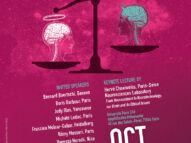événements, rencontres INC
Les lauréates du Vendredi 13
Ce Vendredi 13 de l’INC a été une pleine réussite. Quarante doctorantes, doctorants et postdocs y ont présenté leurs travaux sous formes de communications orales, posters et vidéos et ont amplement échangé sur leurs recherches avant que nous partagions tous… Continue reading
événements, rencontres INC
Le Vendredi 13 de l’INC!
Venez découvrir les recherches des équipes de l’INC le Vendredi 13 Janvier à partir de 14h au siège de l’Université Paris Cité, 12 rue de l’Ecole de Médecine
Plus de 40 doctorants, doctorantes et postdocs présenteront leurs travaux dans l’Amphithéâtre… Continue reading
événements, séminaires
25 Novembre 2022 – Hélène Puccio (Institut NeuroMyoGene, Université Claude Bernard, Lyon et Institut de Génétique et de Biologie Moléculaire et Cellulaire, Université de Strasbourg) – Disruption of the CoQ10 biosynthetic Complex Q causes mitochondrial dysfunction and Ca2+ imbalance in Purkinje neurons in COQ8A-ataxia
COQ8A-Ataxia is a rare form of neurodegenerative disorder due to mutations in the COQ8A gene. The encoded mitochondrial protein is involved in the regulation of Coenzyme Q10 biosynthesis. Previous studies on the constitutive Coq8a-/- mice indicated specific alterations of cerebellar… Continue reading
événements, séminaires
2 Décembre 2022 – Gabriel Lepousez (Unité Perception et Mémoire, Institut Pasteur) – How brain circuits sense and integrate peripheral immune signals
Upon infection, bacterial compounds, and the pro-inflammatory cytokines they elicit, induce a complex response coordinated by the brain and known as “sickness behavior”. This response induces stereotyped behavioral changes (reduced locomotion and food intake, social avoidance), metabolic adjustments (fever, glycemia),… Continue reading
événements, séminaires
9 Décembre 2022 – Jean-Michel Perrin (Institut de Biologie Paris-Seine) – Reconstructing rodent and human neuronal networks to model neurodegenerative syndromes
Human brain is a complex organ composed of several hundred billions of cells and even more numerous interconnected cellular interactions. There is a high demand for experimental models to study these interactions in various contexts, ranging from cognitive sciences to studies… Continue reading
événements, séminaires
28 Octobre 2022 – Christophe Bernard (Institut de Neurosciences des Systèmes, Université d’Aix-Marseille) – The timescale dynamics of epilepsies: from seconds to decades
Continuous long-term recordings (months to years) in patients with epilepsy directly show that seizures are regulated not only in a circadian manner, but also on a much slower time scale (days to weeks). They strongly suggest the existence of specific… Continue reading
événements, séminaires
14 Octobre 2022 – Anne-Noël Samaha (Université de Montréal) – Addiction to cocaine: How you take the drug is more decisive than how much
Exceptionnellement ce séminaire aura lieu en Salle des thèses (3ème étage) – Campus Saint-Germain-des-Prés, 45 rue des Saints-Pères, 75006 Paris
A widely used preclinical procedure to study features of cocaine addiction involves allowing laboratory animals to take drug continuously,… Continue reading
événements, séminaires
7 Octobre 2022 – Fekrije Selimi (Collège de France, Paris)- The developmental history of the molecular synaptic code controlling excitatory connectivity
The mature brain results from the formation of precise networks between functionally and morphologically distinct types of neurons. A given neuron forms synapses with a limited number of partners and on precise subcellular localizations. Understanding what controls this specificity is… Continue reading
événements, rencontres INC
20 Octobre 2022 – INC Day 2022 – Neuroethics
L’ INC Day, organisé en partenariat avec les masters BioMedical Engineering – Paris et NeuroParis et soutenu par la Faculté des Sciences de l’Université Paris Cité et l’Ecole Universitaire de Recherche Science Psychologique, est dédié cette année à l’éthique. Quels… Continue reading
événements, séminaires
30 Septembre 2022 – Valeria Cavalli – Satellite Glial Cells in sensory nervous system health, injury and disease
Exceptionnellement ce séminaire aura lieu en Salle des thèses (3ème étage) – Campus Saint-Germain-des-Prés, 45 rue des Saints-Pères, 75006 Paris
Research in my laboratory focuses on elucidating the principles and mechanisms by which peripheral nervous system neurons regenerate, and… Continue reading


